Best
DIGITAL PIANO
-
Overall: OLED Display That Makes Navigation Easy
-
Best Feature: Spatial Headphone Sound Technology Enhances The Depth And Realism Of The Sound
-
TedScore™: 8.5/10
Best
GRAND
PIANO
Grand Piano INCREDIBLE SOUND
AND
LONGEVITY
-
Overall: Utilises 3 Pedals For Full Sostenuto
-
Best Feature: Made From High-Quality Materials
-
TedScore™: 9/10
Best
PIANO KEYBOARD
-
Overall: Explore A Range Of Styles And Genres With A Range Of Tones
-
Best Feature: Easy To Carry With A Slim And Compact Design
-
TedScore™: 7/10
As a professional pianist, every time I press those white and black keys and start hearing the melodies they produce, I can’t help but feel the physical and emotional benefits of playing piano.
You might wonder what these benefits specifically are. How can a piano affect a person when it’s just an instrument?
Maybe you’re interested in learning piano and want to know the positive effects of playing it.
If that is you, keep reading, my fellow musician!
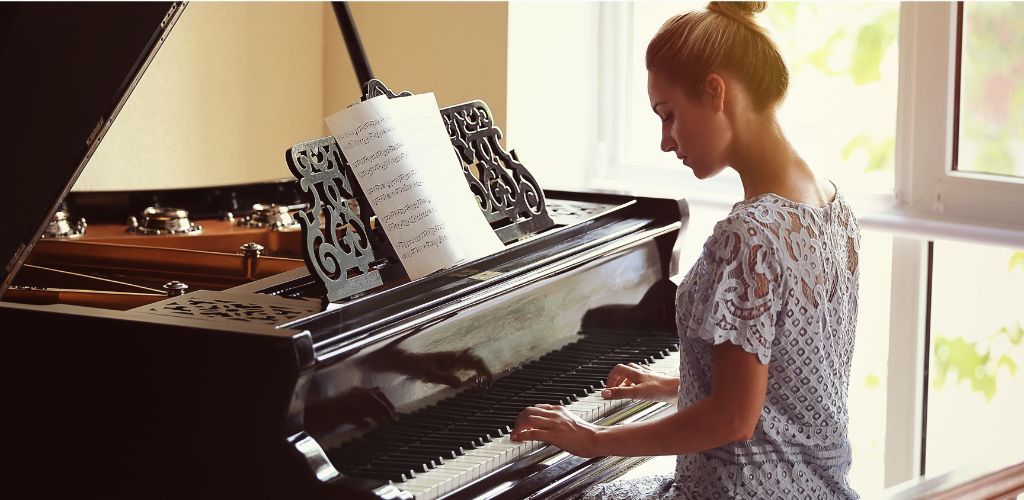
In this article, I will talk about the different benefits a person will have when they play the piano.
With every chord and all the piano lessons you master, you feel a sense of achievement and joy, which nurtures a positive mood beyond the music room.
Engaging with piano music training regularly can be a source of relaxation and an effective way to express creativity, allowing you to weave your unique emotional tapestry with every melody.
Cognitive and
Academic Benefits
Who would have thought that playing the piano isn’t just a fun hobby but can also be a full-blown gym session for your brain?
Every note you strike and every melody you master gives your cognitive muscles a serious workout. Let’s find out how!
Memory and Concentration

Your brain gets tuned up with every practice session on the piano.
Research has shown improvements in memory can be directly linked to learning and playing music. A study from the Educational Psychology Journal links musical training, specifically piano lessons, to improved memory and cognitive skills.
You’re not just remembering songs; you’re boosting your brain’s speed and enhancing its neuroplasticity (Don’t panic! It simply means your brain’s way of reorganizing brain cells!).
By consistently practicing, you’ll sharpen your attention to detail and honing your ability to focus. It’s like a two-for-one deal: Concentration becomes as natural to you as breathing!
Enhanced Academic Skills
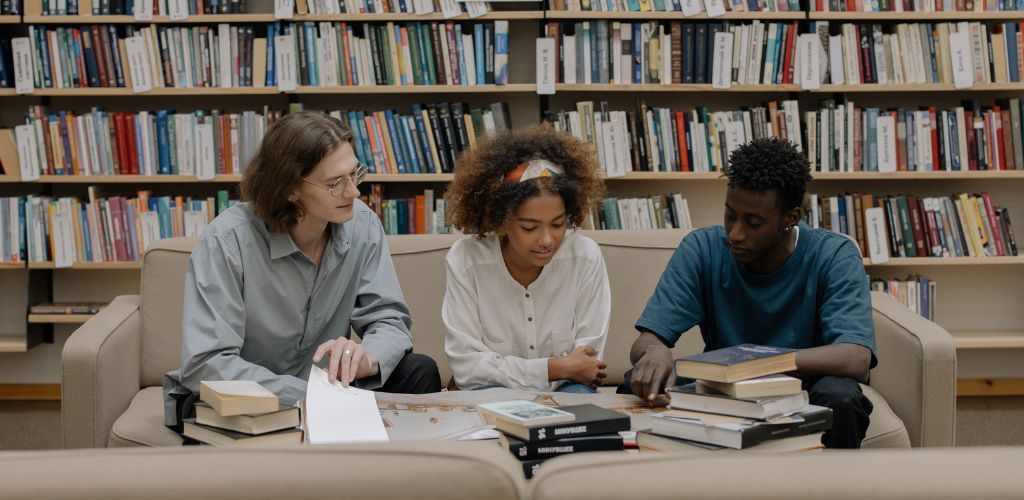
Music and language are like peas in a pod; you nurture both when you play piano.
Your language skills flourish, making the learning of vocabulary words more intuitive. No wonder why jazz pianists often have a way with words, too!
When it comes to math, those rhythms and patterns aren’t just for show. Playing musical instruments amplifies your comprehension of math skills, supporting your overall academic performance.
Studies suggest students who play musical instruments also score higher on standardized tests. How cool is that?
Problem-Solving and Creativity

Playing piano puts you in the composer’s seat, where creativity blossoms with every piece you learn.
This creative exercise magnifies problem-solving abilities. Because, let’s face it, interpreting a Chopin étude is like solving a musical Rubik’s Cube!
Being nimble on the keys means training your brain to think outside the usual boxes.
Cognitive development gets a boost, making you a maestro at navigating life’s twisty-turny challenges. It’s not just about the music; it’s about the mindset you develop!
Physical and Mental
Health Advantages
Playing the piano isn’t just a feast for the ears; it’s a full-body workout for your brain and biceps!
Let’s explore how those black-and-white keys can boost your mood and muscle.
Stress Relief and Mental Health
If you’ve ever felt the soothing power of music, especially piano music, you’re onto something.
Regular piano playing can significantly reduce stress levels, lower blood pressure, and create a calmer nervous system.
Reduces anxiety: Melodies can act like a brain balm, easing your worries.
Lessens depression: The piano becomes a partner in expressing emotions, which can lighten the heavy load of depression.
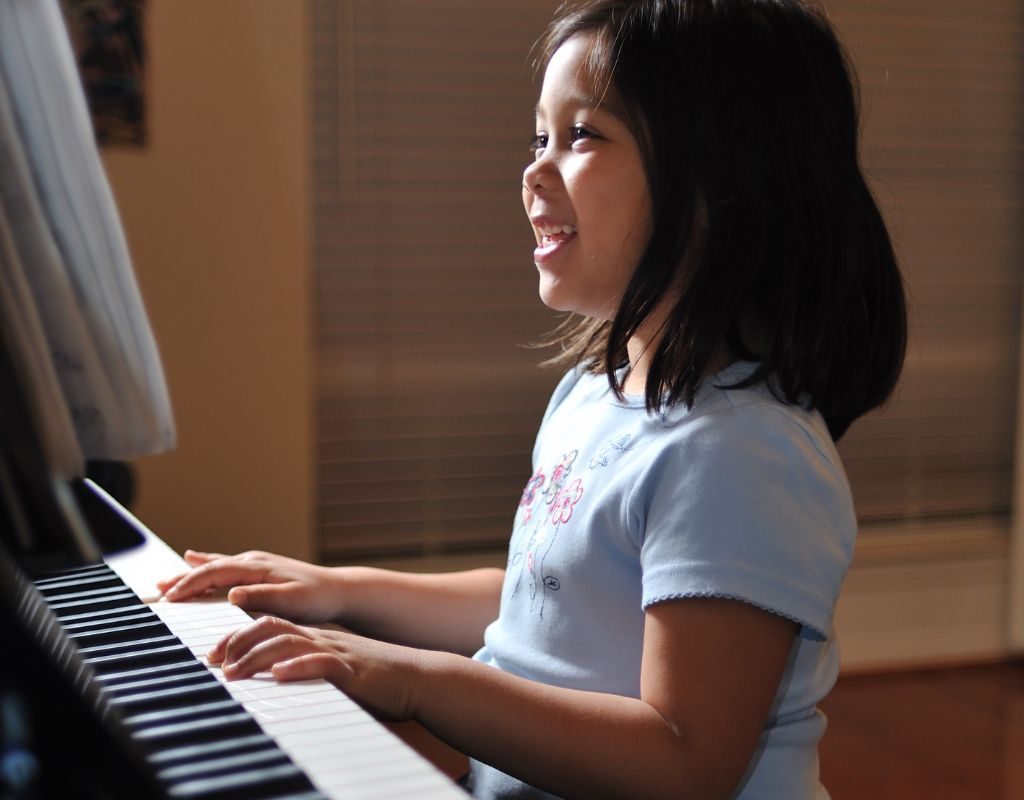
Engaging with music sharpens your mental faculties, like taking your brain to the gym.
Mastering a new piece of music is a surefire way to feel accomplished, which can uplift your overall mood. I know this experience full well!
Motor Skills and Physical Health
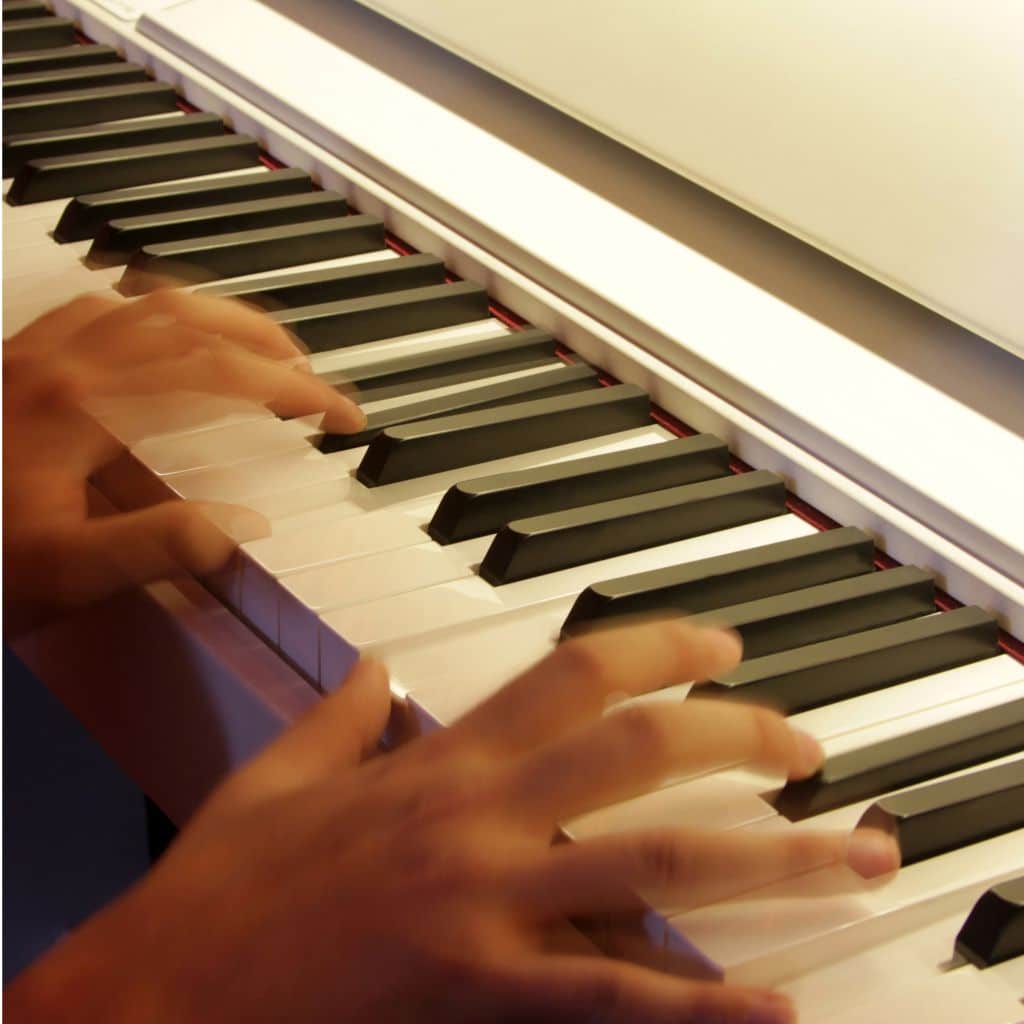
Piano playing is pretty much a physical workout. It requires coordination of all ten fingers and continual hand-eye teamwork, keeping those fine motor skills in tip-top shape.
Enhances dexterity: Each finger becomes robust and more independent.
Boosts hand-eye coordination: You’ll get better at catching your phone before it nosedives off the table.
Regular sessions at the piano can be a form of exercise, especially for your upper body and even your respiratory system.
While breathing deeply, concentrating on those notes, and learning piano, your immune response is getting a tune-up, reducing the risk of certain cardiac complications.
Keep in mind that a happy hour spent playing the piano can foster a stronger, healthier you!
Emotional and
Social Benefits
Playing the piano has numerous emotional and social benefits that can enhance one’s overall well-being. By learning to play the piano, individuals can develop essential life skills that can benefit them in various aspects of their lives.
Develops Empathy and Self-Awareness
Playing the piano requires individuals to be aware of their emotions and to express them through music. This can help develop empathy and self-awareness, essential skills for building strong relationships and achieving personal growth.
By understanding and expressing their emotions through music, pianists can develop a deeper understanding of themselves and others.
Imagine sitting at the piano, your fingers gliding over the keys as you pour your heart into a piece of music.
This act of translating emotions into melodies can be incredibly therapeutic.
It’s like having a heart-to-heart conversation with yourself, helping you understand your feelings better.
This self-awareness naturally extends to others, making you more empathetic and attuned to their emotions.
Research has shown that playing a musical instrument can increase empathy and self-awareness in individuals.
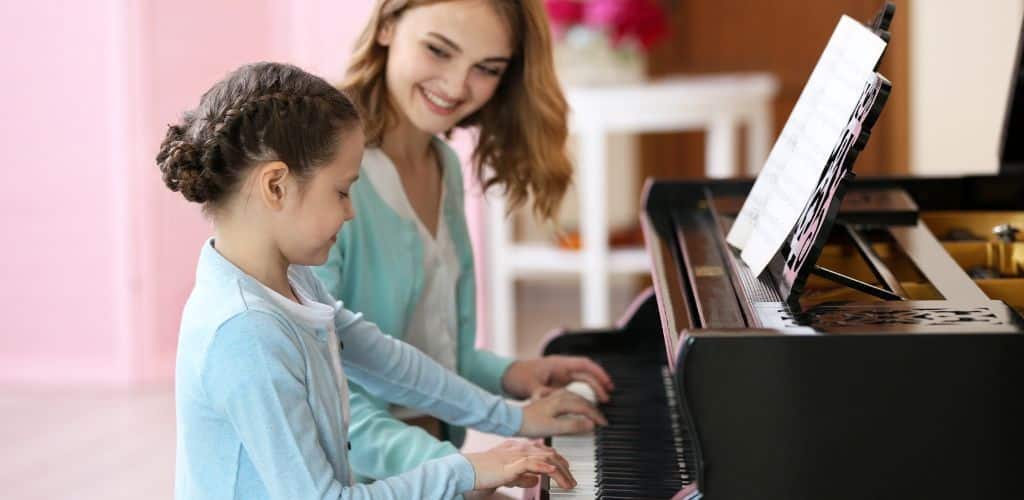

A study published in the Journal of Research in Music Education found that music students showed significant improvements in empathy and self-awareness compared to non-music students.
So, every time you sit down for a piano practice session, you’re not just honing your musical skills; you’re also nurturing your emotional intelligence.
Fosters Social Connections and Community
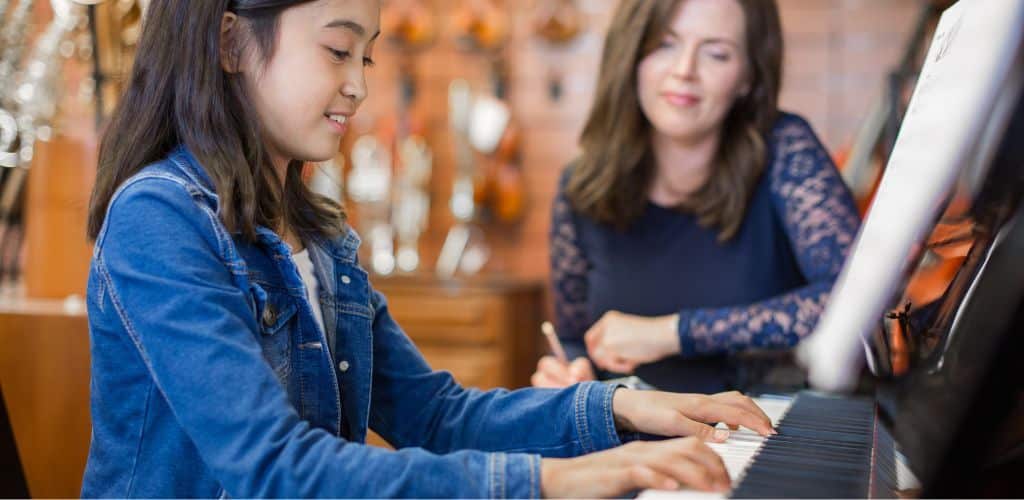
Playing the piano can also foster social connections and a sense of community. Joining a piano group or playing with others can provide opportunities to meet new people and build relationships. Additionally, playing the piano can be a great way to connect with others who share similar interests and passions.
Think about the joy of playing a duet with a friend or performing at a local event. These experiences create bonds and memories that last a lifetime. The piano becomes a bridge, connecting you with fellow music enthusiasts and creating a supportive network.
Whether it’s a casual jam session or a formal recital, these social interactions enrich your life and provide a sense of belonging.
Playing the piano can also provide a sense of belonging and community. Many pianists join piano groups or attend piano concerts and events, which can provide a sense of connection and community.
Research has shown that playing a musical instrument can increase social connections and a sense of community in individuals.
So, by embracing the piano, you’re not just learning an instrument; you’re joining a vibrant community of music lovers.

Personal Development and Discipline
Aside from being an artistic expression, learning to play the piano enhances your personal growth and indirectly instills valuable life disciplines.
Self-esteem and Social Skills
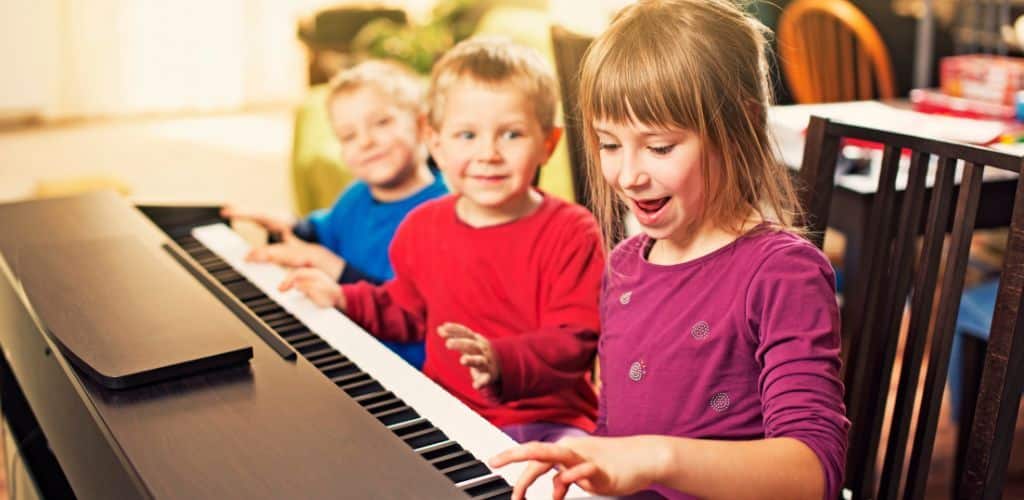
Playing the piano gives you the power to express yourself, fostering self-esteem through mastery of some musical pieces. Playing classical music is not easy!
Hitting every note with precision increases confidence. This surge in self-worth then transitions to social spheres, as music often serves as a communal language.
Your performances lead to family gatherings and community events, where you create connections and strengthen bonds.
Furthermore, sharing your music means receiving constructive criticism, which helps refine your skills. In receiving feedback, you learn to communicate effectively and persevere through challenges.
This leads to developing a supportive network of friends who share your passion for music and encourage your progress.
Patience and Time Management
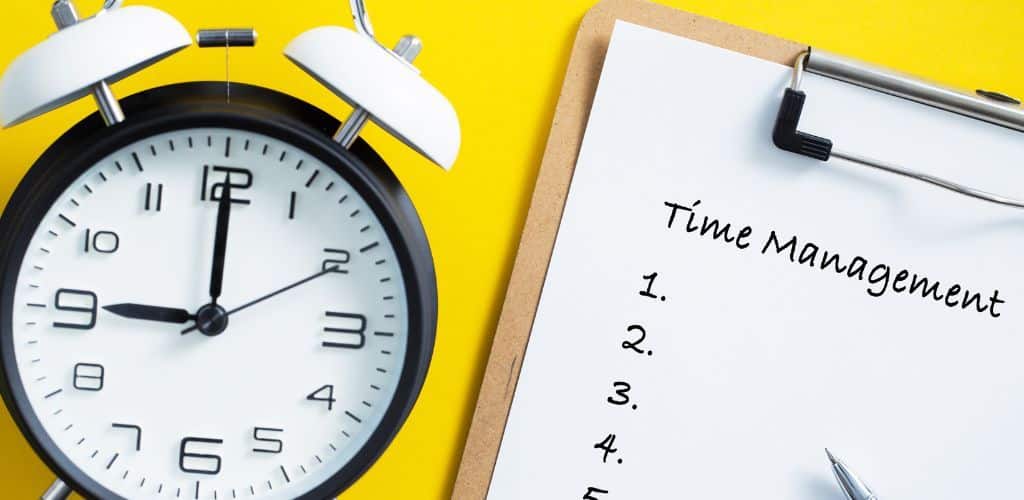
Mastering an instrument like the piano doesn’t happen overnight. It takes lots of discipline and patience.
It requires setting aside regular piano practice time and balancing it with other commitments. Your journey through music teaches you to manage your schedule efficiently, an essential skill for all facets of life.
Additionally, as you progress, you find that challenging, tough pieces no longer seem daunting. This is a clear sign of your growing perseverance.
Trust me, based on experience, this ability to wait for results and push through obstacles will serve you well beyond the piano bench in your personal and professional life.
Mindfulness and Flow
Playing the piano can also benefit mindfulness and flow. By focusing on the music and the moment, pianists can experience a state of flow, which can be beneficial for mental and physical health.
Gets You into a Flow State
Playing the piano can help you enter a flow state, a mental state of complete focus and engagement. This state can be beneficial for mental and physical health, as it can reduce stress and anxiety and improve mood.
Picture this: you’re deeply immersed in a challenging piece, your mind and body working in perfect harmony. Time seems to stand still, and all your worries fade away.
This is the magic of flow, a state of complete absorption in an activity. When you play the piano, you can enter this state, experiencing a profound sense of peace and satisfaction.
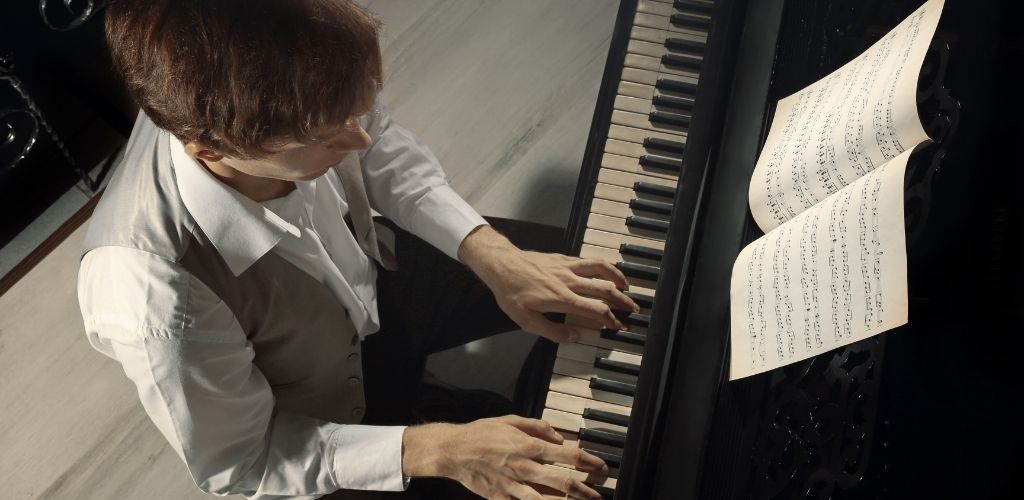
Research has shown that playing a musical instrument can increase flow experiences in individuals. A study published in the Journal of Music Therapy found that music students experienced increased flow experiences compared to non-music students.
These moments of flow are not just fleeting pleasures; they have long-term benefits for your mental and physical health.
Flow experiences can also have long-term benefits for mental and physical health. Research has shown that individuals who experience flow regularly have lower levels of stress and anxiety and improved mood.

So, every time you lose yourself in the music, you’re not just enjoying the moment; you’re also investing in your well-being.
Overall, playing the piano can have numerous emotional and social benefits, including developing empathy and self-awareness, fostering social connections and community, and getting you into a flow state.
By incorporating piano playing into your life, you can experience these benefits and improve your overall well-being.
Top Pianos I Love!
YAMAHA
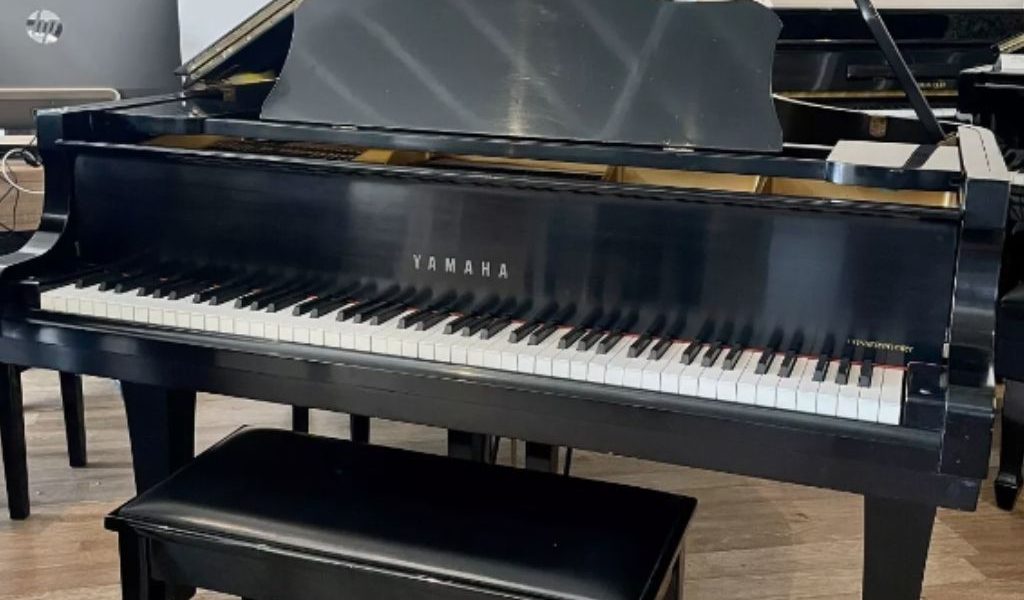
Yamaha pianos have long been known in the music industry.
The Yamaha C3X PE Grand Piano is a testament to this. I love its rich, expressive sound and responsive touch, which demonstrate Yamaha’s commitment to craftsmanship.
Yamaha C3X PE Grand Piano
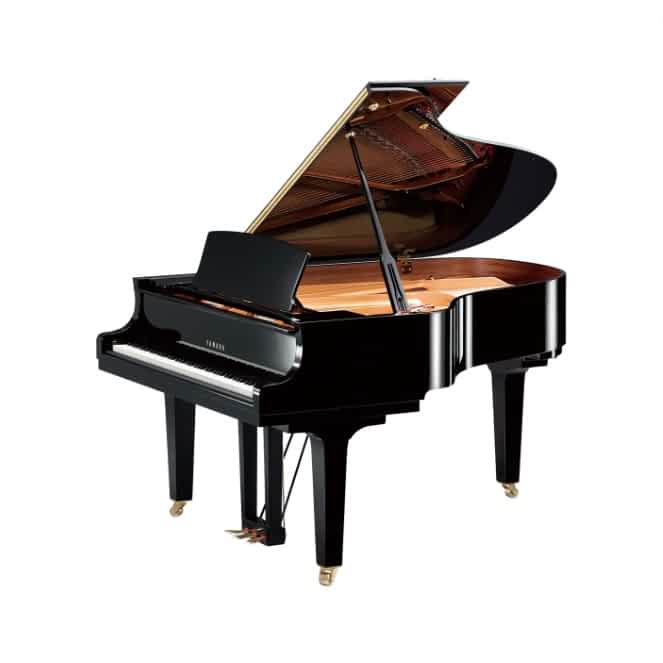
PERFECT FOR: use at home or in small performance spaces
FEATURES: Utilises 3 pedals for full sostenuto
OTHER INFO: Made from high-quality materials
Yamaha C3X PE Grand Piano
- With a length of 186 cm
- Produces beautiful, rich tones
- Available in a range of letters and models (G3, C3, C3X)
- An amazing sound that will make any pianist happy
- A piano that will last a lifetime
- Expensive piano - one of Yamaha's top-tier pianos
When you click ‘Check Price’, you’ll see there are loads of great places to buy this item. Our personal favorite is Sweetwater for the US, and Thomann and Gear4Music for the UK & Europe.
They are the largest music retailers, with excellent customer service, competitive prices, really fast shipping, and the longest guarantees.
The professional musician who wrote this article combined many things,
from the product build, manufacturer’s reputation through to feedback
from other users, to create our famous TedScore™.
ROLAND
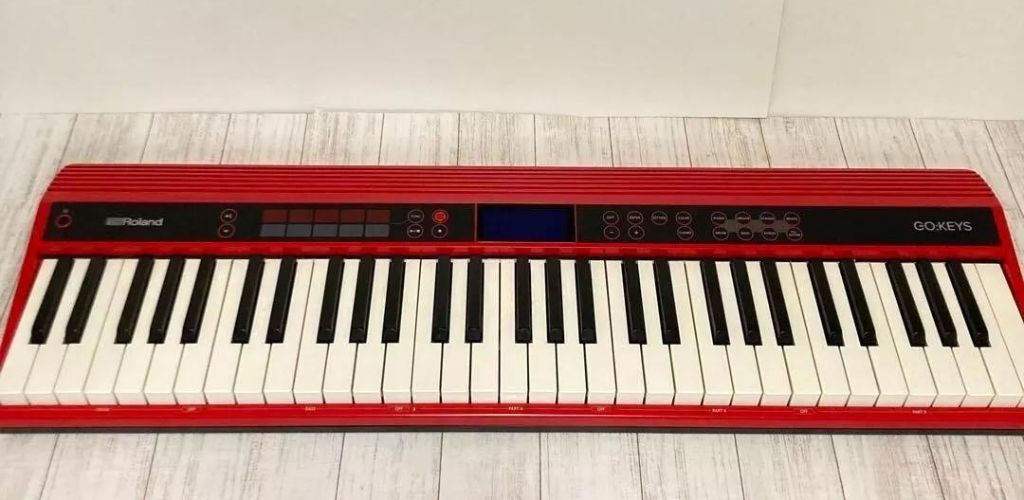
Roland keyboards are known for their cutting-edge technology. They offer a range of sounds and features that cater to beginners and professional musicians seeking versatility and high-quality performance.
Playing the Roland GO: KEYS Music Creation Keyboard is a lot of fun! It’s packed with a wide array of sounds and intuitive loop-mixing features that make it easy to start creating and playing music immediately.
Roland Go: Keys Music
Creation Keyboard
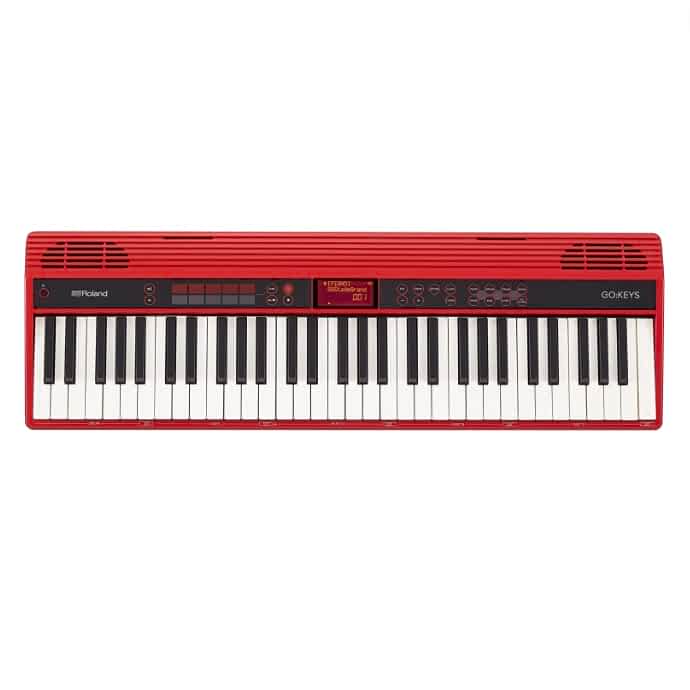
PERFECT FOR: Beginner players
FEATURES: Explore a range of styles and genres with a range of tones
OTHER INFO: Easy to carry with a slim and compact design
Roland Go: Keys Music
Creation Keyboard
- Create songs instantly with the Loop Mix function
- Play along to your favourite songs via Bluetooth audio
- On-board speakers don't sound very good
When you click ‘Check Price’, you’ll see there are loads of great places to buy this item. Our personal favorite is Sweetwater for the US, and Thomann and Gear4Music for the UK & Europe.
They are the largest music retailers, with excellent customer service, competitive prices, really fast shipping, and the longest guarantees.
The professional musician who wrote this article combined many things,
from the product build, manufacturer’s reputation through to feedback
from other users, to create our famous TedScore™.
Kawai
Let’s not forget the Kawai pianos! This digital piano’s touch is so authentic you might forget it’s not acoustic. It’s perfect for your lively living room gigs and at-home practice sessions.
I love the Kawai CN29 Digital Piano. Its realistic touch and beautiful tone closely mirror an acoustic piano experience, making it an excellent choice for both practice and performance.
Kawai CN29 Digital Piano

PERFECT FOR: beginner musicians
FEATURES: OLED display that makes navigation easy
OTHER INFO: Spatial Headphone Sound technology enhances the depth and realism of the sound
Kawai CN29 Digital Piano
- Includes Kawai's lesson function to learn classic piano pieces
- Adjust the instrument's parameters with the Virtual Technician app
- Creates rich and expressive sounds like the SK-EX and EX concert grand pianos
- With Superior Headphone Sound technology to enhance playing experience
- Advanced mode requires an iPad to access
When you click ‘Check Price’, you’ll see there are loads of great places to buy this item. Our personal favorite is Sweetwater for the US, and Thomann and Gear4Music for the UK & Europe.
They are the largest music retailers, with excellent customer service, competitive prices, really fast shipping, and the longest guarantees.
The professional musician who wrote this article combined many things,
from the product build, manufacturer’s reputation through to feedback
from other users, to create our famous TedScore™.
Benefits of Playing Piano:
Things to Keep in Mind!
Learning to play the piano has a lot of benefits for your mind and overall well-being.
Your cognitive skills get a significant boost, like a rigorous gym session for your mind. This can lead to improved memory, attention, and spatial-temporal skills.
It has been known to stir up creativity. The piano offers your inner artist free range to paint with melodrama. By mastering the piano, you’re honing your discipline and time management. It’s a musical way of fine-tuning your life skills, one note at a time.
It can be a stress reliever. It’s like turning the volume down on your worries while turning up the Mozart in your mind.
Involvement in piano lessons can lead to increased social opportunities. Think of it as your ticket to join a community of music lovers.
Developing musical skills could also boost your confidence. Imagine stealing the show at the next family gathering!
With regular piano practice, you even promote better hand-eye coordination.
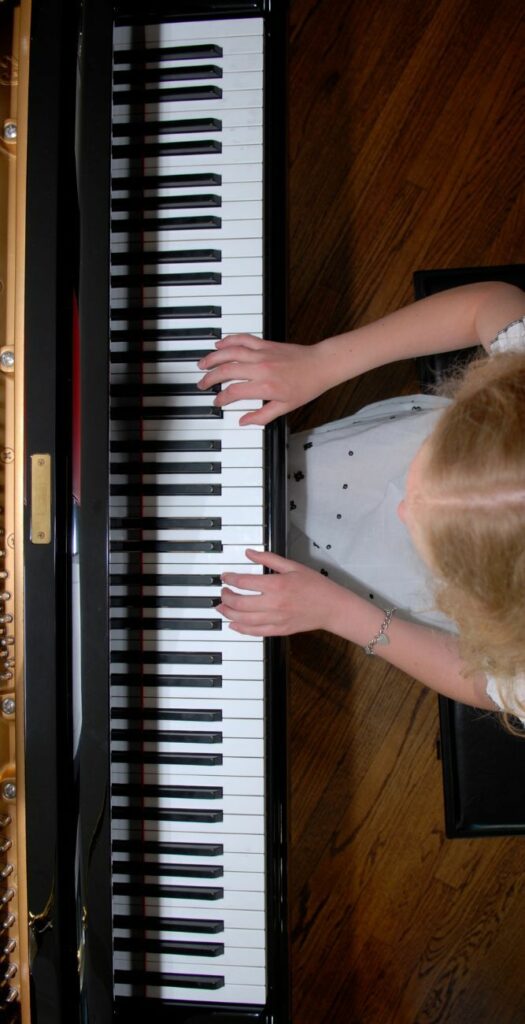
Lastly, embracing the world of piano music lessons can enrich your cultural knowledge. It’s a musical journey through history and cultures without leaving your seat!
So, with all these benefits, I suggest you get up and start playing. Don’t go just yet…
Now that you know the positive effects of playing the piano, it is time to learn how to play it. If you want to learn or know someone who wants to learn the piano, you might want to check this next article!
FAQ's
Playing the piano can improve cognitive abilities, enhance coordination and discipline, and provide a creative outlet for emotional expression, contributing to overall mental and physical health, well-being, and relaxation.
Yes, playing the piano is good for the brain. It engages multiple cognitive functions, including memory, spatial-temporal skills, and hand-eye coordination, and can enhance overall mental health and brain plasticity.
Playing the piano is a skill that can be developed through practice and learning. However, some individuals may have a natural talent for a musical instrument, making it easier for them to excel.
Playing the piano primarily builds the muscles in the fingers, hands, and forearms and engages the core muscles for proper posture and balance.










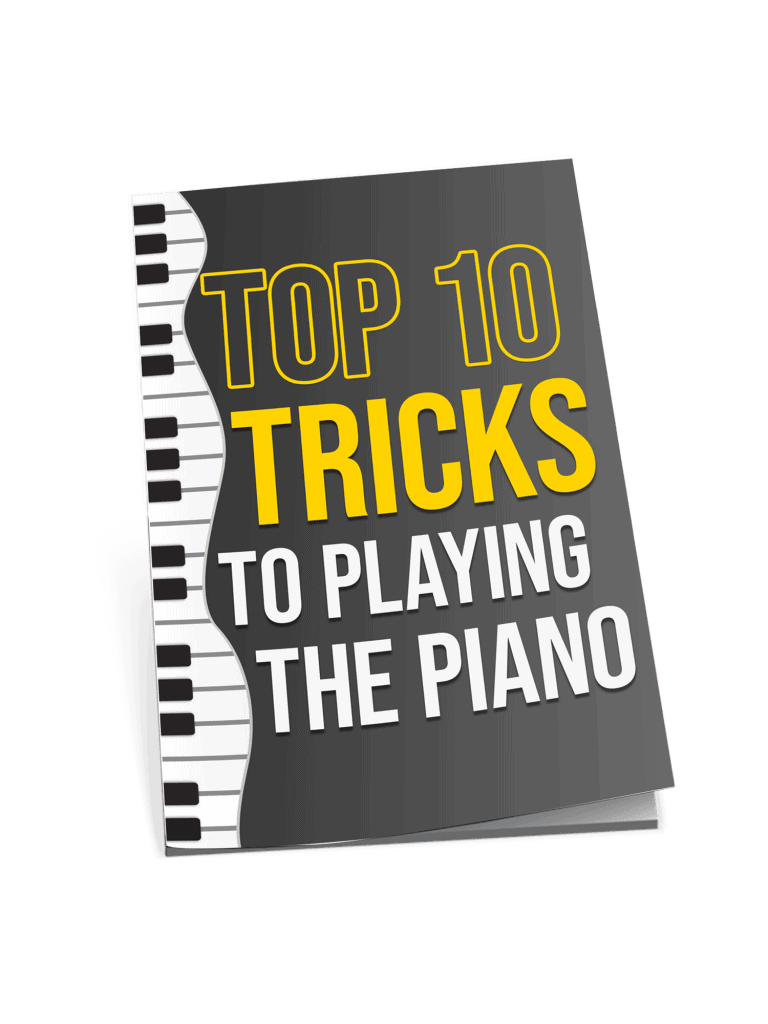
Robert Emery, I must commend you on the deep dive into the cognitive and academic benefits of playing the piano. It’s fascinating how engaging in music can enhance one’s memory, creativity, and even problem-solving skills. It serves as a poignant reminder of the multifaceted advantages contained within the art of music, transcending mere auditory pleasure to touch upon personal development and intellectual growth.
Does playing ‘Chopsticks’ count as getting into a flow state? Asking for a friend.
I found the section on piano brands particularly interesting. It’s good seeing Yamaha and Roland getting praise; they’ve always been my go-to for digital pianos. I’m curious about Kawai though, haven’t had the chance to try one. Anyone here has?
Kawai’s grand pianos are top-notch. Their digital pianos? Not bad, but Yamaha has them beat for overall feel and sound quality, in my opinion.
Caught the bit about stress relief and mental health. Trying to juggle work and kids, you know? Does playing piano really help with that or is it just another chore to pile on?